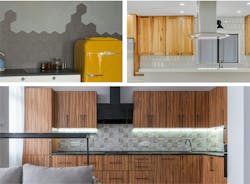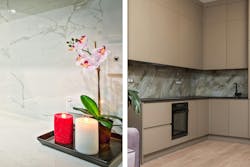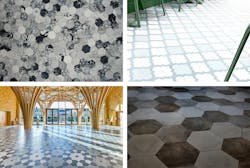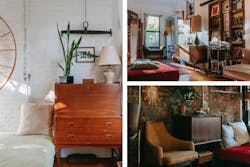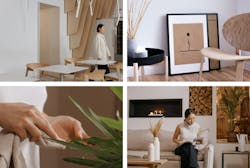The New Home Trends Institute (NHTI) by John Burns Real Estate Consulting puts out monthly research reports on trends (obviously) in design and construction. The March 2022 Survey Insights Report looked specifically at the focal point of the home: the kitchen.
Over 1,200 homeowners provided feedback on their usage, style, and material preferences. Here are a few kitchen trends that NHTI believes are set to “explode” in 2022.
5 KITCHEN TRENDS FOR 2022
Here are five notable kitchen trends to look out for this year:
1. Unique tile shapes (texture, hexagonal shapes, etc.)
Now this is a topic I’ve wanted to talk about for a while. Hexagons! Why are they everywhere these days?
From honeycombs to turtle shells, hexagons are regarded as nature’s “perfect shape.” It seems that people are embracing its uniqueness, ditching the solid square tile for a pattern that is a bit untraditional. Perhaps it’s a new wave of modern design, or just a refreshing change for some.
Besides hexagons, other shapes like triangles and ovals are making their way into kitchen tile design.
“The maker details of textured tiles are a look that is being embraced,” says Kerrie Kelly, creative director of Kerrie Kelly Design Lab. “Especially when the tiles are made from recycled products, telling a sustainability story.”
Assuming we can make any unique designs from sustainable sources, what’s the next big trend? Embracing the trapezoid?
2. Slab backsplashes
Though tile shapes offer unique detail, many still enjoy the sleek, clean look of slab backsplashes. Typically, the slabs showcase a continuous use of natural stone: quartzite, granite, marble and more.
The look has been used in both modern and rustic kitchens, with no signs of the style falling to the wayside.
Slab backsplashes are not only popular for their smooth look, but also for opening up a room—making the kitchen feel larger than it really is.
3. Patterned floors
Oh, you thought we were done with hexagons?
Kitchen floors can be more than square tiles and engineered wood. Unique patterns and shapes add a bit more personality to a space.
Triangular formats can lead to especially abstract and dramatic floor designs. Encaustic or terrazzo tiles might be used to offer a bold statement to the kitchen, for example.
4. Vintage furniture
“Vintage furniture is exploding due to supply chain issues and long furniture lead times,” says Kelly.
Vintage furniture brings history to a space, and repurposing old furniture (rather than buying new) aids in reducing our carbon footprint.
Combining vintage furniture with modern pieces can look like minimalist chairs surrounding an antique dinner table, or repurposing old document drawers as a kitchen island.
5. Japandi influence (Japanese and Scandinavian)
Moretti Interior Design describes Japandi as emphasizing “simplicity, organization, and minimalism.”
It’s a combination of Japanese and Scandinavian elements; marrying the Japanese’s sleek and simple interiors with Scandinavian “hygge” (coziness and comfort). Japandi’s color schemes range from beige to slightly darker beige—using muted tones that work together in harmony.
Some, like Moretti Design, compare Japandi to biophilic design—a popular style as of late that aims to emphasize nature and promote human wellness. After the pandemic left many people feeling trapped by their four walls, some interior designers have found biophilic design to be useful in reconnecting nature and self.
This includes shades of earthy brown colors, the use of natural stone, and open floor plans—all of which are elements of Japandi design as well.
According to Moretti, other key elements of Japandi style include natural fibers and sustainable materials, like wood, bamboo, and rattan. Another important feature? Plants. So, yeah, it’s basically just a minimalist form of biophilic design.
To find out how to get access to the March Survey Insights Report, and other exclusive research from the New Home Trends Institute (fresh reports released monthly), visit NewHomeTrendsInstitute.com or email Allie Martin at [email protected].

